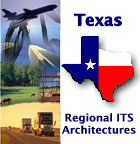| 1.0 | TRAVEL AND TRAFFIC MANAGEMENT |
| 1.5 | TRAVELER SERVICES INFORMATION |
| 1.5.2 | TSI shall include an Information Access function that allows travelers to access the available information. |
| 1.5.2.5 | Information Access shall provide the capability for travelers to access the TSI information via any of, but not limited to, the following methods: |
| 1.5.2.5(a) | Highway advisory radio. |
| 1.6 | TRAFFIC CONTROL |
| 1.6.0 | ITS shall include a Traffic Control (TC) function. Traffic Control provides the capability to efficiently manage the movement of traffic on streets and highways. Four functions are provided, which are, (1) Traffic Flow Optimization, (2) Traffic Surveillance, (3) Control, and (4) Provide Information. This will also include control of network signal systems with eventual integration of freeway control. |
| 1.6.1 | TC shall include a Traffic Flow Optimization function to provide the capability to optimize traffic flow. |
| 1.6.1.7 | Implementation of the Control function shall include strategies that account for at least the following: |
| 1.6.1.7(a) | Human factors. |
| 1.6.3 | TC shall include a Device Control function. |
| 1.6.3.3 | The Device Control function shall provide the capability to exercise control over those devices utilized for traffic control. |
| 1.6.3.3.2 | Device Control shall include the capability to dynamically control traffic signing. |
| 1.6.3.4 | Device Control shall communicate control data to the following devices. |
| 1.6.3.4(c) | Information signs. |
| 1.6.3.4(e) | Human operator support. |
| 1.6.3.4.1 | Traffic Surveillance shall include a data process function to process the traffic data which are acquired. |
| 1.6.4 | Device Control shall provide traffic control information to other elements of the ITS, including but not limited to the following: |
| 1.6.4(a) | In-vehicle navigation. |
| 1.6.4(b) | Trip planning. |
| 1.6.4(c) | Routing systems. |
| 1.6.4(d) | Fleet management systems. |
| 1.7 | INCIDENT MANAGEMENT |
| 1.7.0 | ITS shall include an Incident Management (IM) function. Incident Management will identify incidents, formulate response actions, and support initiation and ongoing coordination of those response actions. Four major functions are provided, which are, (1) Incidents Identification, (2) Response Formulation, (3) Response Implementation, and (4) Predict Hazardous Conditions. |
| 1.7.1 | Incident Management shall provide an Incident Identification function to identify incidents. |
| 1.7.1.1 | The Incident Identification function shall include the capability to identify predicted incidents. |
| 1.7.1.1.1 | The Incident Identification function shall use information from the following types of sources, where available, to identify predicted incidents: |
| 1.7.1.1.1(d) | Media sources. |
| 1.7.3 | IM shall include a Response Implementation function to provide the services to implement a response coordinated with all appropriate agencies. |
| 1.7.3.3 | The Response Implementation function shall provide the capability to disseminate information relating to response status to other agencies and user services. |
| 1.7.4 | IM shall provide the capability to Predict Hazardous Conditions, including the time and location of hazardous conditions that may cause an incident. |
| 8.0 | MAINTENANCE AND CONSTRUCTION MANAGEMENT |
| 8.1 | MAINTENANCE AND CONSTRUCTION OPERATIONS |
| 8.1.1 | Maintenance and Construction Operations shall provide a Maintenance Vehicle Fleet Management (MVFM) function to schedule and dispatch, monitor and track location, and monitor operational condition and maintenance requirements of public and contracted fleets of maintenance, construction, and specialized service vehicles. This function includes interactions among Traffic Managers, Supervisors, Dispatchers, Field Crews, Construction Crews, Vehicle Maintenance Crews, Equipment Maintenance Crews, Weather Services Organizations, and Information Service Providers. |
| 8.1.1.6 | MVFM shall be capable of providing dispatchers and operators of maintenance, construction, and specialized service vehicles with information regarding potential and actual roadway problems. |
| 8.1.1.6.1 | MVFM shall provide information to dispatchers and vehicle operators, including but not limited to: |
| 8.1.1.6.1(a) | Congestion |
| 8.1.1.6.1(b) | Incidents |
| | |












 Web Spinner Technology.
Web Spinner Technology.